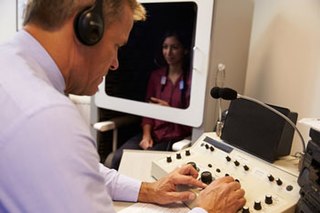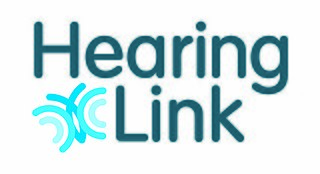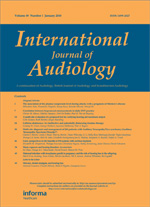Ototoxicity is the property of being toxic to the ear (oto-), specifically the cochlea or auditory nerve and sometimes the vestibular system, for example, as a side effect of a drug. The effects of ototoxicity can be reversible and temporary, or irreversible and permanent. It has been recognized since the 19th century. There are many well-known ototoxic drugs used in clinical situations, and they are prescribed, despite the risk of hearing disorders, for very serious health conditions. Ototoxic drugs include antibiotics, loop diuretics, and platinum-based chemotherapy agents. A number of nonsteroidal anti-inflammatory drugs (NSAIDS) have also been shown to be ototoxic. This can result in sensorineural hearing loss, dysequilibrium, or both. Some environmental and occupational chemicals have also been shown to affect the auditory system and interact with noise.

Audiology is a branch of science that studies hearing, balance, and related disorders. Audiologists treat those with hearing loss and proactively prevent related damage. By employing various testing strategies, audiologists aim to determine whether someone has normal sensitivity to sounds. If hearing loss is identified, audiologists determine which portions of hearing are affected, to what degree, and where the lesion causing the hearing loss is found. If an audiologist determines that a hearing loss or vestibular abnormality is present, they will provide recommendations for interventions or rehabilitation.
The Doctor of Audiology is a professional degree for an audiologist. The AuD program is designed to produce audiologists who are skilled in providing diagnostic, rehabilitative, and other services associated with hearing, balance, tinnitus management, and related audiological fields. These individuals help patients with hearing problems primarily by diagnosing hearing loss and fitting hearing assistive devices.
Sound Seekers was a British charity which works to improve the lives of deaf children and children with ear diseases in the developing countries of the Commonwealth of Nations. It provided specialist equipment, training and support to some of the poorest countries of the world, where people with the 'hidden disability' of deafness may otherwise not receive the help they need. In 2020, Sound Seekers merged with DeafKidz International, with the combined charity using the DeafKidz International name.

Dafydd Stephens was an audiological physician, holding the post of Honorary Professor of Audiological Medicine at the Cardiff University School of Medicine at Cardiff University. He was also a visiting professor at Swansea University and the University of Bristol. He previously worked as a consultant audiological physician at the Welsh Hearing Institute, University Hospital of Wales.

Pure-tone audiometry is the main hearing test used to identify hearing threshold levels of an individual, enabling determination of the degree, type and configuration of a hearing loss and thus providing a basis for diagnosis and management. Pure-tone audiometry is a subjective, behavioural measurement of a hearing threshold, as it relies on patient responses to pure tone stimuli. Therefore, pure-tone audiometry is only used on adults and children old enough to cooperate with the test procedure. As with most clinical tests, standardized calibration of the test environment, the equipment and the stimuli is needed before testing proceeds. Pure-tone audiometry only measures audibility thresholds, rather than other aspects of hearing such as sound localization and speech recognition. However, there are benefits to using pure-tone audiometry over other forms of hearing test, such as click auditory brainstem response (ABR). Pure-tone audiometry provides ear specific thresholds, and uses frequency specific pure tones to give place specific responses, so that the configuration of a hearing loss can be identified. As pure-tone audiometry uses both air and bone conduction audiometry, the type of loss can also be identified via the air-bone gap. Although pure-tone audiometry has many clinical benefits, it is not perfect at identifying all losses, such as ‘dead regions’ of the cochlea and neuropathies such as auditory processing disorder (APD). This raises the question of whether or not audiograms accurately predict someone's perceived degree of disability.
Auditory processing disorder (APD), rarely known as King-Kopetzky syndrome or auditory disability with normal hearing (ADN), is a neurodevelopmental disorder affecting the way the brain processes sounds. Individuals with APD usually have normal structure and function of the ear, but cannot process the information they hear in the same way as others do, which leads to difficulties in recognizing and interpreting sounds, especially the sounds composing speech. It is thought that these difficulties arise from dysfunction in the central nervous system.
The UCL Ear Institute is an academic department of the Faculty of Brain Sciences of University College London (UCL) located in Gray's Inn Road in the Bloomsbury district of Central London, England, previously next to the Royal National Throat, Nose and Ear Hospital, the UK's largest ear, nose and throat hospital until it closed in 2019.
Tele-audiology is the utilization of telemedicine to provide audiological services and may include the full scope of audiological practice.

Hearing, Balance and Communication is a peer-reviewed medical journal covering the field of hearing, balance and communication disorders. It is the official journal of the International Association of Physicians in Audiology, as well as the British, Swedish, and Danish Associations of Audiological Physicians and the Società Italiana di Audiologia. It was known as the Journal of Audiological Medicine from 1992 to 2002 and as Audiological Medicine from 2003 to 2013. Hearing, Balance and Communication has been published quarterly by Taylor and Francis Group since 2003 and is edited by Alessandro Martini. It is indexed in PsycINFO.

Hearing LinkServices is part of Hearing Dogs for Deaf People, a UK-wide charitable organisation for adults with hearing loss, their family and friends. The head office is in Saunderton, Buckinghamshire. Its Royal Patron is The Princess Royal.
Despite having the largest economy in South America or Central America, Brazil is still considered a developing country due to its low gross domestic product, or GDP, per capita, low living standards, high infant mortality rate and other factors. "With regard to hearing health, the Brazilian government established the national policy for giving attention to hearing health in 2004, in which the Ministry of Health, considering the social magnitude of hearing impairment in the Brazilian population and its consequences, presented the proposal to structure a network of services set up by regions and in hierarchy that aims to be implemented in all federative units of Brazil, with integrated actions to promote ear health, hearing impairment prevention, treatment and rehabilitation organized and managed by the National Health System, Sistema Único de Saúde (SUS), in Portuguese," writes Bevilacqua et al. (2010)
Audiology and hearing health professionals in India is made up of Indian healthcare professional that focus on audiological and hearing problems.

Brian C.J. Moore FMedSci, FRS is an Emeritus Professor of Auditory Perception in the University of Cambridge and an Emeritus Fellow of Wolfson College, Cambridge. His research focuses on psychoacoustics, audiology, and the development and assessment of hearing aids.

Robert Beiny is a British hearing aid audiologist based in Harpenden, Hertfordshire, UK.

The International Society of Audiology (ISA) was founded in 1952 to "facilitate the knowledge, protection and rehabilitation of human hearing" and to "serve as an advocate for the profession and for the hearing impaired throughout the world". It serves as the professional association for those who work in audiology and related fields of knowledge, from all over the world. The ISA is constituted as a corporate body by Article 60 et seq, of the Swiss Civil Code, registered in the Swiss register du Commerce de Genève.
Lucy Yardley is a British psychologist and professor of health psychology based at both the University of Bristol and University of Southampton. She is a senior investigator at the National Institute for Health Research (NIHR) and has a continuing role at the University of Southampton as Director of the LifeGuide Research Programme, and the Behavioural Science theme of the NIHR Biomedical Research Centre.

Richard Charles Dowell is an Australian audiologist, academic and researcher. He holds the Graeme Clark Chair in Audiology and Speech Science at University of Melbourne. He is a former director of Audiological Services at Royal Victorian Eye and Ear Hospital.
Global Audiology is an open access platform designed to enhance understanding of audiology education and practice worldwide. Despite the global of hearing disorders the World Health Organization (WHO) reported a substantial gap between the need and access to hearing care services, particularly in low- and middle-income countries. Among several audiological services that can be provided, it is estimated that only 17% of those who can benefit from a hearing aid have access to one. The WHO report emphasizes the importance of integrating ear and hearing care into national health plans to achieve universal health care coverage.









